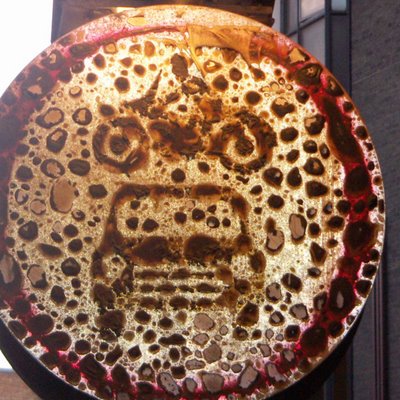Rackham - 21/12/2006@Beursschouwburg Café, Brussel

Toine Thys - ts, cl (website | MySpace)
Bart Maris - tp
Benjamin Clément - g
François Verrue - el b
Teun Verbruggen - d
+
Delphine Gardin, Sacha Toorop - voc
Not only was this Toine Thys's Rackham CD release party (Juanita K, on Teun Verbruggen and Bruno Vansina's R.A.T. Records. Four of its tracks are on the MySpace), it was also sort of his stag night, as he was to get married the next day. Judging by their surnames, they're compatible people: her's is T'Sas and the mere possibility of children named Thys-T'Sas (theestsas) is enough to make me happy.
I can't help drawing broad conclusions when talking about this band. Rackham fits snugly within the Nate Chinen-defined indie-rock/jazz fusion, which I consider to be the latest incarnation of jazz-rock. The contrast with the previous night's concerts was instructive both in regards to my tastes and the evolution of the genre.
If mid-70s Fusion welded together prog-rock, bebop, Hendrix and Brazil, today's jazz-rock has different influences and goals. Rackham's harmonic language and colour was much grungier (not necessarily in the Grunge-with-a-capital-g sense) than Bota Fogo (which Toine is also a member of) and its melodies and arrangements more song-like, employing the full range of verse, chorus, bridge, interlude, etc. If this music is successful, it's because it manages to go pop without sounding dumbed-down: Rackham's arrangements are far more elaborate than the average straight-ahead tune and Toine prides himself on employing a fairly rich harmonic palette. In a sense, complexity is shifted from individual heroics to a more collective realisation.
The fact that it's not really a soloist's band - though there are solos, they're not the focus - also brings Rackham in line with the zeitgeist: see Ratliff on Darcy and Darcy on the role of solos in his big band ("the biggest thing about the music that I write is that it's telling a story, it's going from here to here, and it needs to hit certain points. Even the soloists who are improvising need to understand the ebb and flow of the piece"). Think lower-tech Kneebody* or a friendlier (ie. less English?) Acoustic Ladyland.
Despite the up-to-the-minute references, I can't help but think that this kind of music, with its desire to put the song ahead of its chords and the feet before the brain while taking a firm knowledge of both sides for granted, goes back a long way: to early party-worthy jazzy r'n'b; Miles and Red turning "My Funny Valentine" into a dramatic experience. Only now, the pop melodic language is completely different, obviously.
Francis Davis recently made an interesting statement: "The only remaining incentive for a jazz instrumentalist to do standards—the best reason all along—is what they have to offer harmonically" (never mind that it contradicts what he says two paragraphs earlier). I don't think that's true - musicians just as often use standards as a brak from more demanding originals and in any case they'll either substitute the chords they really want on the fly or write them into their own tunes - but it does suggest that musicians aren't playing the song, aren't making it a dramatic experience, but using it as a building block. Which is fine, but I see the indie/jazz thing, at least in some of its incarnations, as a way of putting the experience of the song itself back in the spotlight. It is perhaps not strange, then, that when the two guest singers from the album came up on stage - first separately, then together - the band's dynamic didn't really change: the voices became another layer, despite the words.
And, finally, Rackham just rocks. François Verrue and Benjamin Clément are real rock musicians, providing mid-level fuzz and the requisite textures ("Juanita Kligopoulou"'s Calexico, dusty border-town feel, for example), while Teun exemplifies the kind of ease that's acquired solely with what you grew up on. While Rackham isn't nearly as free-wheeling as Othin Spake, when the rhythm section span off by itself for a rare guitar solo, it was volcanic.
The two horns often bounced off each other, but never competitively. Toine has sought to adapt his playing to the context by paring down and stressing longer notes. Bart Maris did more or less the opposite, just as winningly: his wilder exclamations tapped into the band's electric energy.
* I kind of dissed Adam Benjamin's solo album, but his playing with Kneebody is great, as is the entire band
|